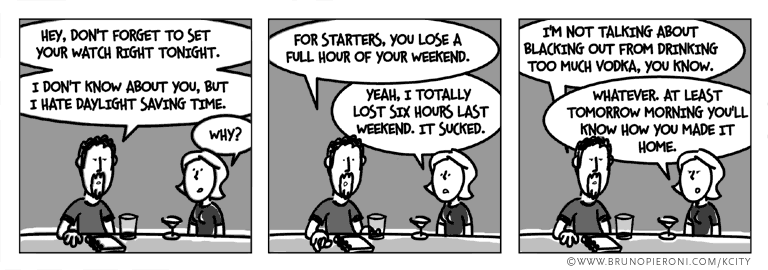 Who's Saving Time? I'd like to know who's saving time, daylight or not, because I could use more of it. Send some to me.
Who's Saving Time? I'd like to know who's saving time, daylight or not, because I could use more of it. Send some to me.The nominal benefit of Daylight Saving
 In normal time, very few people are awake at sunrise and we don't enjoy the benefits of the first hours of daylight, and at the close of the day people are still active during the gloaming hours and we need to spend energy to accomplish our desires.
In normal time, very few people are awake at sunrise and we don't enjoy the benefits of the first hours of daylight, and at the close of the day people are still active during the gloaming hours and we need to spend energy to accomplish our desires.Theoretically, in daylight savings time, the benefit is that our time of waking and beginning work is closer to actual sunrise, so that we have more daylight at the end of the workday. There are statistics that say that we have lower crime rates when DST is in effect, there are fewer car accidents, etc. The record shows that we get excited about DST only during wartime, energy shortages, and economic crises - wow, we're hitting the trifecta now!
 (credit)
(credit) (credit)
(credit) (credit)
(credit) (credit)
(credit)What's magic about the unit of an hour? (Don't even get started on why we're using a 60-based sexagesimal time system, ask the Sumerians). Why is it magic to adjust the time by one hour? The Washington Post has called for Double Daylight Savings Time, in which we move the entire year by one hour, and then move the clocks one hour (total of two) during the summer. It makes sense to me.
The notion that we all go to work at the same time, and all go home at the same time, and that the government can influence our movements by hacking the clocks, assumes that we're working in factories of one form or another - offices, plants, hospitals - places where a lot of people work come together to use capital-intensive equipment that requires a gathering of people to achieve efficiency through economies of scale. It's very industrial age, it's very second wave, it's very 1950s.
We only have to align our schedules if we send children to learning factories (schools). We only have to align our schedules if we go to work in a factory.



Why would you want to align your schedule if it wasn't for factories? Aligned schedules is what causes traffic jams. We've got a great Parkway system, it only backs up if we make everybody go to work at the same time.
And the popular notion that we're blaming the farmers (agrarian first wave) for the schedules built for the factories (industrial second wave) - well, that's just unfair.
Once the government starts aligning schedules, where/why does it stop? All the research I read says the optimal school schedule for teenagers is something like 10am - 4pm. (Oops, my parent-of-teenager bias is showing.)
From a web-worker e-perspective, where location and time zones are moot, and the notion of a 24-hour day is a benefit and not a liability, the notion of aligning everybody's schedules seems quaint, archaic, and generally unworkable.




0 comments:
Post a Comment
Comments and Feedback? Love that stuff. Please leave your thoughts in the box below--